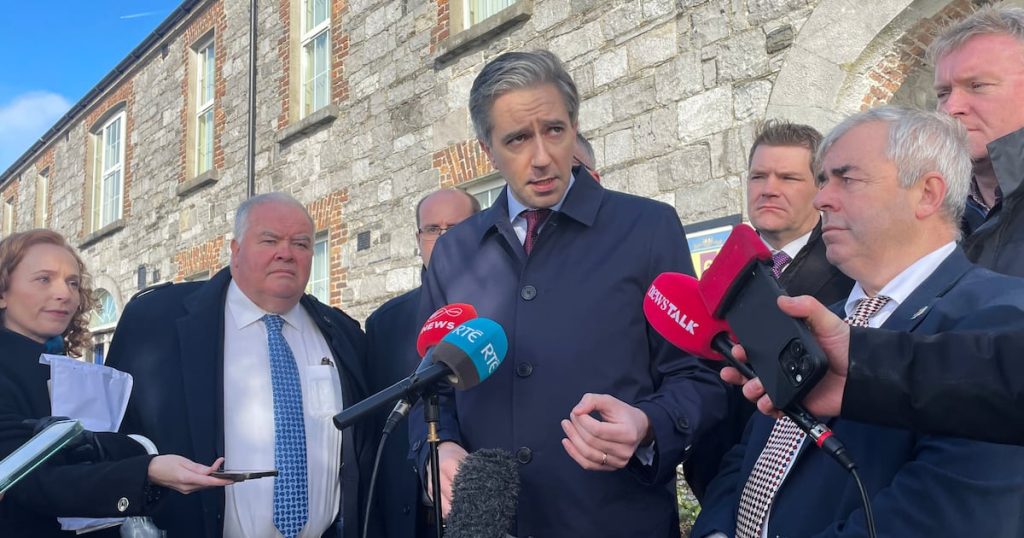Listen to the article
Immigration Discourse Shifts as Irish Government Faces Political Pressure
A significant shift in political rhetoric has emerged in Ireland as government parties grapple with immigration policy following recent electoral setbacks. This development marks a departure from Ireland’s previous approach, which had largely resisted the anti-immigrant posturing seen in many European countries.
Tánaiste Simon Harris made remarks last week that have raised concerns among political analysts and immigration advocates. “Our migration numbers are too high, and I think that is really an issue that needs to be considered in a very serious way by Government,” Harris stated. “One of the reasons I think they are so high is that there are too many people who come to this country and are told they do not have a right to be here, and it is taking too long for them to leave the country.”
The comments, which were later endorsed by senior colleague Pascal Donohoe and Fine Gael TD Barry Ward, appear to suggest that failed asylum seekers awaiting deportation constitute a major portion of what Harris considers excessive immigration—a claim that statistical evidence does not support.
Official figures paint a different picture of immigration in Ireland. Approximately 125,000 people arrived in Ireland in the 12 months to April this year. Of these, 31,500 were returning Irish citizens, leaving about 94,000 migrants from other countries. By contrast, only 2,403 deportation orders were signed in 2024, with 1,116 individuals departing the state. This leaves 1,287 people—less than two percent of annual immigration—who have been ordered to leave but remain in Ireland.
The distinction between asylum seekers and the broader immigrant population is significant. Last year, Ireland received 18,560 asylum applications, a fraction of overall migration figures. The majority of newcomers to Ireland arrive through legal channels with explicit permission to live and work in the country.
The composition of Ireland’s immigrant population is diverse and economically significant. More than 25,000 migrants are EU citizens who have freedom of movement rights, while nearly 5,000 are UK citizens with special status under post-Brexit arrangements. Approximately 63,000 come from other nations, including Ukrainians with refugee status and individuals on student visas or work permits.
These latter groups include construction workers, hospitality staff, healthcare professionals, and specialists recruited by multinational companies—all filling crucial roles in Ireland’s economy. International students contribute significantly to the financial sustainability of Irish universities and third-level institutions.
The timing of this rhetorical shift follows political setbacks for government parties, particularly in the recent presidential election. This context has raised questions about whether the government is adopting a harder line on immigration in response to electoral concerns rather than substantive policy issues.
Critics argue that conflating the small number of failed asylum seekers awaiting deportation with Ireland’s broader immigration picture risks creating misleading impressions about migration as a whole. Such discourse, they suggest, mirrors tactics employed by far-right movements elsewhere, where specific subcategories of migrants are used to characterize entire immigrant populations.
While there appears to be broad consensus that efficient processing of asylum claims and timely deportation procedures are reasonable policy objectives, observers note that focusing narrowly on these issues may distract from more comprehensive discussions about Ireland’s immigration needs, integration policies, and infrastructure requirements.
As Ireland continues to navigate economic growth, demographic changes, and international obligations, the quality and accuracy of the immigration debate will likely remain a crucial factor in shaping both public perception and policy outcomes in the months ahead.
Fact Checker
Verify the accuracy of this article using The Disinformation Commission analysis and real-time sources.




10 Comments
Spreading disinformation on such a sensitive topic is irresponsible and risks further polarizing the public. I hope the government will provide a more balanced and evidence-based perspective on immigration.
While immigration is a complex and sensitive issue, it’s important to rely on facts and data rather than unsubstantiated claims. The statistics on asylum seekers awaiting deportation don’t seem to support the assertion of ‘excessive immigration’.
You raise a fair point. Policymakers should be cautious about making broad generalizations without a thorough review of the evidence.
This rhetoric seems to shift the discourse in a concerning direction, away from Ireland’s traditionally welcoming stance on immigration. I hope the government will approach this issue with nuance and respect for facts.
I agree. Immigration policies should be informed by data, not political pressure. Striking the right balance is crucial for Ireland’s values and economy.
It’s disappointing to see the government seemingly caving to political pressure on this issue. I hope they will resist the temptation to scapegoat vulnerable groups and instead focus on nuanced, data-driven solutions.
Well said. Responsible policymaking requires looking beyond short-term political gains and considering the long-term impacts on society.
This shift in rhetoric is concerning and risks undermining Ireland’s reputation as a welcoming, inclusive society. I hope the government will reconsider this approach and focus on evidence-based, humane immigration policies.
I agree. Responsible governance requires resisting the temptation of populist rhetoric and upholding the values of a diverse, tolerant Ireland.
While immigration is a complex challenge, making unsubstantiated claims about ‘excessive’ numbers is counterproductive. I hope the government will rely on facts and engage constructively with all stakeholders.